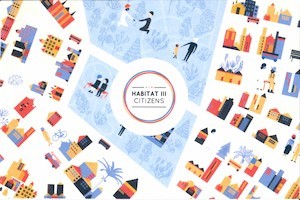Associate Professor Margaret Lombe presents recommendations to the United Nations on building inclusive cities.
Last spring, we reported in this space that BCSSW Associate Professor Margaret Lombe had joined 20 other academics, government officials, non-profit executives, and social activists in Lima, Peru as part of an initiative convened by the United Nations (UN) to make recommendations on creating more inclusive cities across the world. This October, the team’s final report was presented to, and accepted by world governments during Habitat III, the organization’s conference on housing and sustainable urban development that took place in Quito, Ecuador. (Watch a webcast of the meetings here).
Now, five BCSSW students have joined Lombe in a supplementary project to create specific measureable indicators related to the sustainable development goals outlined during Habitat III’s meetings. Joining Lombe in this task are BCSSW PhD candidates Kaipeng Wang, Yoosun Chu, and Ngozi Enelamah, as well as MSW candidates Madison Tallant and Peliun Wu.
“Habitat III purposefully presented a broad overview of the challenges facing the world in developing global standards with regards to sustainable development in our world’s cities,” explains Lombe. “Now, we have a unique opportunity to work within that framework to provide concrete action steps that address the social dimensions of Habitat III’s paradigm. Of course, as students and practitioners of social work, this is right in our wheelhouse.”
Lombe was a member of Policy Unit 1, a group tasked with responding to the question, “who has the right to the city?” The final document determined nine necessary components for a city to be considered as existing for the common good, including:
… a city free of discrimination; a city of inclusive citizenship; a city with enhanced political participation; a city fulfilling its social functions; a city with quality public spaces; a city of gender equality; a city with cultural diversity; a city with inclusive economies, and a city of inclusive environments (Check out the final policy paper, in its entirety, here).

Habitat III was the United Nations Conference on Housing and Sustainable Urban Development. It took place in Quito, Ecuador from October 17-20.
The Boston College team is focusing on the “social functions” of the inclusive city. Its next step will be to seek out a partnership with the United Nations Development Programme (UNDP) or the World Bank to gauge interest for a pilot study to develop baseline data against which indicators could be compared and tested. The BC students are currently hard at work analyzing all of Habitat III’s 11 position papers towards creating a comprehensive proposal for the UNDP and other interested parties.
“It’s an exciting process for us to be a part of,” Lombe explains, “and one that we plan to document along the way. We’re hopeful that, in addition to providing concrete indicators for the UN and its member states to use in assessing its cities, we can also share our findings from this process during a seminar in the not-so-distant future. This is a real opportunity for social workers to establish our place at a table that matters, and we aim to help our colleagues to place themselves successfully in similar situations moving forward.”

